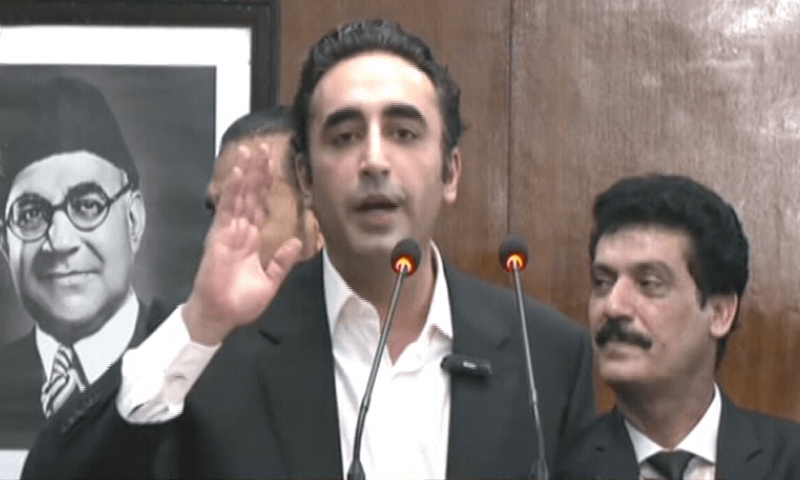Chairman of the Pakistan Peoples Party, Bilawal Bhutto, emphasized the need to establish a constitutional court to ensure that no future Prime Minister faces execution and that the citizens of the country receive justice.
Speaking at the Sindh High Court Bar in Karachi, he highlighted the historical connection of his family with the Sindh High Court, stating, “We know each other inside and out for three generations.”
Bilawal pointed out that he belongs to a family and party that has provided the country with its constitution. He reflected on Pakistan’s history of military rule, mentioning how the 1973 Constitution was often disregarded with mere gestures from authoritarian leaders. He condemned the complicity of judges who allowed such violations, leading to prolonged periods where democracy and constitutional rights were neglected.
He expressed deep concern over the treatment of the constitution, which has been torn apart, and lamented how judges permitted amendments by authoritarian regimes. He criticized the narrative that the political elite were so corrupt that they were above the law, asserting that the democratic system should not tolerate even a single judge who takes a PCO oath.
Bilawal acknowledged the sacrifices made by generations for the restoration of democracy, aiming for representatives who would enact laws reflecting the will of the people. He reminded the audience of the Charter of Democracy signed by his mother, the late Benazir Bhutto, which laid the groundwork for restoring democracy and resolving public issues through such agreements.
He claimed that after the 18th Amendment and the restoration of the 1973 Constitution, they fulfilled Benazir’s unfinished mission. He noted that while Iftikhar Chaudhry served as a PCO judge, Benazir had determined the need for a constitutional court and judicial reforms to provide immediate justice to the public.
Bilawal reflected on the broken judicial system in Pakistan, stating that thousands of cases remain pending in courts, and he himself had to wait 45 years for justice. He argued that if we want our citizens to receive prompt justice without discrepancies between provinces, a federal constitutional court is essential, with equal representation from all provinces and a rotating Chief Justice.
He pointed out that a significant portion of court time is consumed by political cases and stressed that these institutions should be allowed to perform their intended functions.
Bilawal highlighted the detrimental impact of clauses like Article 58(2)(b) and 63(A), which were used to unjustly dismiss democratic governments. He condemned how the courts retained the power to amend the constitution, influencing decisions that resulted in the removal of elected Prime Ministers.
He reassured the audience that while skepticism about the intentions of the Prime Minister, judges, or institutions is permissible, his commitment to the supremacy of the constitution remains unwavering. He stated, “I will fight this battle, and it is crucial that all provinces receive fair representation.”
Bilawal concluded, “We will establish a constitutional court so that no future Prime Minister faces execution, and the people of this country can attain justice.”
**On Floor Crossing Penalties**
In response to a question from journalists about floor crossing, Bilawal mentioned the systems in the US and the UK, where there are no such restrictions on party loyalty. He clarified that the amendment to Article 63(A) imposed certain conditions regarding party discipline during critical votes, allowing parliamentarians the choice to vote according to their beliefs.
He stated that while they aimed to deter floor crossing, they also wanted to impose strict penalties to ensure that parliamentarians would consider the implications of their votes. He expressed that if there were threats of lifelong disqualification for crossing the floor, it would compel representatives to reconsider their actions on critical votes.
Bilawal stressed the need for accountability, asserting that the judiciary should not have the power to enforce party loyalty, as it undermines the democratic process.



